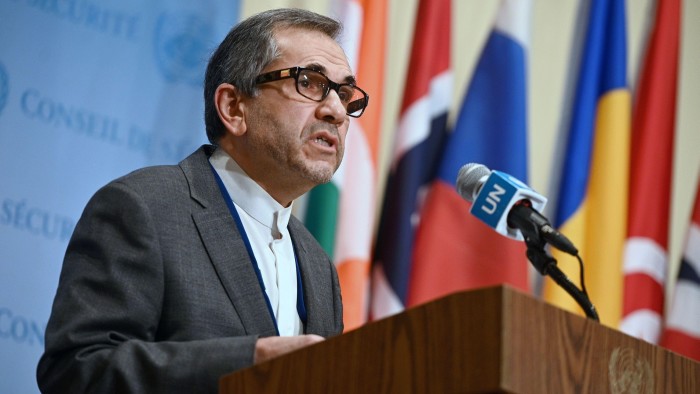Iran has kept the door open to negotiations with the incoming Donald Trump administration, while warning the US president-elect that any attempt to reimpose “maximum pressure” on the Islamic republic would fail to extract concessions.
Majid Takht-Ravanchi, Iran’s deputy foreign minister for political affairs, told the Financial Times that coercion and intimidation would prove ineffective in the long-running stand-off between Iran and the west over Tehran’s nuclear programme.
“As for negotiations, we need to observe US policy and decide how to respond accordingly,” Takht-Ravanchi said in his office at the foreign ministry in Tehran. “Right now, the key question is how the new administration will approach Iran, the nuclear issue, regional security and the Middle East. It’s premature to speculate about specific outcomes.”
Takht-Ravanchi said the nuclear deal reached with the west in 2015, from which Trump later withdrew the US, “could still serve as a foundation and be updated to reflect new realities”, adding that “if the other parties return to their commitments, we have repeatedly said that we are willing to do the same”.
He added: “We do favour negotiations, as we proved [with that deal] . . . But who sabotaged the negotiations previously? It was the Trump administration who was unwilling to negotiate.”
At the same time, the veteran diplomat and former nuclear negotiator warned that if Trump again takes a tough approach, “maximum pressure will be met with maximum resistance”.
“We will continue to work around sanctions, diversify our trade partners and strengthen regional relations to maintain calm,” he added.
During his first term, Donald Trump triggered a nuclear stand-off with Iran after he abandoned the 2015 accord, known as the JCPOA, that Tehran had signed with world powers, and imposed waves of sanctions on the Islamic republic in what he called a “maximum pressure” campaign.
He accused Tehran of violating the “spirit” of the agreement by funnelling newfound revenue to support its regional proxies, notably Lebanon’s Hizbollah. In retaliation, Iran dramatically expanded its nuclear activities, and is enriching uranium near to weapons-grade despite insisting its programme is for civilian purposes.
Trump has nominated Iran hawks for senior posts as he prepares for his second term at a time when the republic faces mounting internal and external pressures.
Iran’s economy has been strangled by sanctions, while Israel has weakened militant groups close to Iran — such as Hizbollah and Hamas — and Iran and the Jewish state have traded direct missile fire during a year of regional conflict following Hamas’s October 7 2023 attack.
Last month Israel launched its biggest attack on Iran, targeting missile factories and air defences in retaliation for an earlier Iranian attack on Israel.
People familiar with Trump’s thinking have told the Financial Times his administration would try to “bankrupt” Iran to force the republic into talks.
The regional and nuclear crises have stoked fears in Tehran that Trump will once again try to drive Iran’s oil exports — its vital source of hard currency — to zero. In recent years Iran has substantially increased oil sales, mainly to China.
Takht-Ravanchi sought to downplay the potential for tighter oil sanctions under a second Trump presidency.
“While developments may occur, they won’t lead to significant changes,” he said, adding: “If the Trump administration decides to pursue the maximum pressure policy in the oil market again, it will surely fail. In today’s world, no single country can dictate terms to the entire international community.”
For now, he said, “We hope he doesn’t repeat the same mistake because the outcome will be no different.”
“The Trump administration claimed that it would bring Iran to the negotiating table [during his first term], but failed to do so. It is up to them to practice the same approach for another four years and fail again. But that is an irrational thing to do,” Takht-Ravanchi said.
Reformist President Masoud Pezeshkian was elected in July on promises of resolving the nuclear crisis to secure sanctions relief.
Pezeshkian is not the ultimate decision maker on foreign policy, but has the potential to influence supreme leader Ayatollah Ali Khamenei and the elite Revolutionary Guards if he can demonstrate the economic benefits of negotiations. Failure to do so could embolden hardliners who oppose the JCPOA.
The appointment of foreign minister Abbas Araghchi, a former nuclear negotiator, and figures such as Takht-Ravanchi has signalled a possible willingness to show flexibility in dealings with Washington.
Takht-Ravanchi denied media reports citing US and Iranian officials that said last week that Iran’s UN ambassador Amir Saeid Iravani had met the US entrepreneur and close Trump ally, Elon Musk.
“No such meeting took place . . . Had such a meeting occurred, we would have been very transparent about it,” Takht-Ravanchi said, adding that Iranian ambassadors customarily meet non-official figures such as academics.
In his first term, Trump ordered the assassination of General Qassem Soleimani, Iran’s top Guards commander for overseas operations.
Iran vowed to avenge his death, and this month the justice department accused Iran’s government of hiring a man to set in motion plots to assassinate perceived enemies of the regime, including Trump. Iran has denied being involved in any plot to kill Trump.
On Soleimani, Takht-Ravanchi said only that “our judiciary has initiated legal proceedings and will continue along this path based on our principles”.
There are concerns in Tehran that Trump could support Israeli Prime Minister Benjamin Netanyahu if he decides to escalate against Iran.
Iran has yet to retaliate for last month’s Israeli attack. Takht-Ravanchi said Iran “does not seek war, confrontations or tensions, even though it is prepared to confront any imposed war”.
He said, however, that Tehran would keep supporting its allies in the “axis of resistance” of militant groups that have been firing on Israel. “We continue to support the resistance movement. That is the policy of the Islamic republic and will not change.”
Read the full article here




